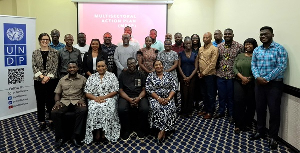Vice Chancellor for the University of Professional Studies Accra (UPSA) Prof. Abednego Okoe Amartey has advised his students to desist from acts that may lead them to contracting Sexually Transmitted Infections (STI’s).
He acknowledged that university living allows for students to enjoy a level of freedom and so tend to explore their sexuality.
Prof. Amartey was speaking to freshers at the matriculation ceremony for the 2019/2020 intake for various undergraduate, postgraduate and professional courses on Friday in Accra.
He said “furthermore, it has been established that the university is a place where many students choose to explore their sexuality owing to the ‘new freedom’ and ‘independence’ from parents.“
“In recent times, there have been troubling unconfirmed reports from university campuses of an upsurge in cases of STI’s including HIV/AIDS amongst students. It is the reason why you need to take good care of yourself so that you do not add to the statistics. Let the following catch words for HIV/AIDS prevention ring constantly in your mind; abstinence, be faithful, and use a condom,” he urged.
He added “let me also touch on personal hygiene. Maintaining good personal hygiene does not only make you appealing and attractive but also keeps all types pf infections and diseases at bay. Remember, cleanliness is next to Godliness. Strictly observe cleanliness of your body, your mind and your environment.”
The university admitted its highest intake in the history of the school, confirming a record of 5,957 fresh students including 80 professional programmes students, 1,122 diploma students, 4, 059 undergraduate students and 696 postgraduate students.
The 80 professional programmes students have 50 males and 30 males. The 1,122 diploma students are made up of 533 males and 589 females. For the 4,059 undergraduate registered students, 2,175 are males and 1,884 are females, while the 696 post graduate registered fresh students comprised 408 males and 288 females.
This measured a 35.17 percent increase over last year, with a ratio of male to female freshers standing at 53:47.
General News of Sunday, 6 October 2019
Source: starrfm.com.gh













